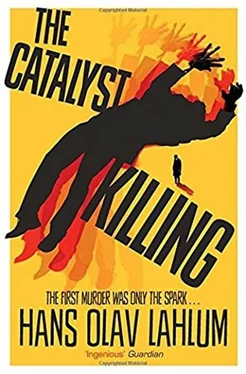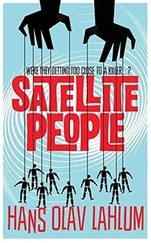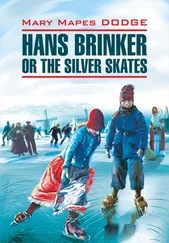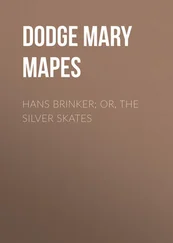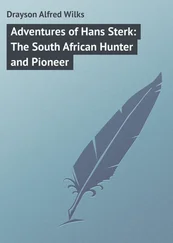Henry Alfred Lien’s eyes turned reluctantly up from the floor. He looked me in the eye again when he carried on.
‘So that is the story of the greatest mistake of my life. I’m not a Nazi, never have been, and every day I regret that I pretended that I was during the war. I did it for my son’s sake and he will never forgive me. So I hope you can understand why I want to leave it all behind me now, and that under no circumstances do I ever want to be associated with the Nazis again. If my son saw any mention of that in the newspaper, all hope would be lost.’
I nodded with understanding. It was about half past one when I finally stood up to leave. It was a powerful story and I really wanted to believe that Henry Alfred Lien deeply repented his sins. And what was more, there was no stick of any sort to be seen. I did jot down, all the same, that he admitted that he had been in contact with other Nazis during the war. And that he did not have an alibi for the night when Falko Reinhardt disappeared, or the evening when Marie Morgenstierne was killed.
Miriam Filtvedt Bentsen was obviously an impressively fast reader. When I got back into the car, she suddenly had only fifty pages left to read of the thick book on nineteenth-century English literature. She continued to read these at the same time as having a rather interesting conversation with me while we drove back down the valley.
Then for the rest of the journey, we spoke uninterrupted.
She reassured me that nothing I told her about the case would ever get out, but hastened to add that she fully understood if I was not able to tell her anything about it, as was probably the case.
Instead we talked about Valdres and hiking in the mountains, which proved to be a shared tradition in both our families. To my relief she only read book number two, on French grammar and linguistic theory, for about five minutes while I filled the tank at a petrol station outside Hønefoss.
Miriam Filtvedt Bentsen was easily persuaded to stop for a bite to eat at a cafeteria shortly after, once it had been established that we would only be half an hour and would still easily be able to reach the party office on time.
It was while we sat there in Hønefoss with our plates of meatballs that I suddenly thought of another question I could ask her – whether she could remember ever hearing, during any of her childhood trips to Valdres, the almost mythical story of the young lad, Karl, who had also vanished in the mountains up there.
Her reaction was so unexpected that I almost jumped. Miriam Filtvedt Bentsen pointed at me across the table in a manner that was almost accusing.
‘Yes, in fact, I read it in a parish yearbook from Valdres when I was twelve. It’s an incredible story. But where did you hear it? And does it have any bearing on Falko’s disappearance?’
I told her honestly that I had no idea yet. But I had heard the story now and thought that the similarity was remarkable, especially given that it had apparently happened in 1868.
Miriam Filtvedt Bentsen nodded eagerly and pointed at me again, then leaned forward across the table.
‘The year is one thing, certainly, but if I remember correctly, it was in fact on the night of 5 August 1868 that Karl vanished into thin air on his way down the mountain in Valdres. I may be wrong – after all, it is ten years since I read the article. But I am pretty sure it was, and could easily find the book and check again as soon as the libraries open on Monday. And if I’m right about the date, then it really is a remarkable coincidence, isn’t it? How exciting!’
I felt my pulse rising, but was not quite sure whether this was due to the incredible coincidence of dates or the sudden outburst of the otherwise so calm Miriam. So I asked her to check the date at the library on Monday, and to contact me as soon as she had. I told her I agreed that if she had indeed remembered the date correctly, it was a very interesting and exciting find. She nodded eagerly again, an unexpected glow in her eyes.
So the mood in the car was very jolly once again for the last two hours as we headed into Oslo. I ventured to ask a bit more about the others who had been at the cabin. She took the hint and spoke only of them for the rest of the trip. However, there was not much new to be gleaned, compared with what she had told me before.
Kristine Larsen was an only child. Both her parents were teachers at Hegdehaugen, but we quickly established that I had not been taught by either of them in my final years.
Anders Pettersen was, in Miriam Filtvedt Bentsen’s words, ‘the prototype artist and communist. Quite possibly talented, but very definitely self-absorbed and ambitious.’
In Miriam Filtvedt Bentsen’s opinion, Trond Ibsen was a far more gifted man, socially, even though he often pushed his psychological reasoning too far.
She had seen Anders Pettersen as Falko’s loyal younger brother, whereas Trond Ibsen had a far more independent role. Anders Pettersen and Trond Ibsen generally shared the same political views, but there had been some rivalry between them since Falko’s disappearance, as they vied for the role of leader. There was a degree of jealousy on Anders’ part, as he could not compete with Trond when it came to family traditions and wealth. The legendary playwright, Henrik Ibsen, was a distant relative, and a number of well-known names from cultural and philosophical circles were in Trond’s immediate family, including, for example, the famous communist and historian Johannes Heftye, who was an uncle on his mother’s side.
She threw me a questioning glance when she said this, and I said that it could well be an important link. It crossed my mind that it was rather odd that neither Trond Ibsen nor Johannes Heftye had said anything about this to me. And that it was a blessing that Miriam Filtvedt was so open with me, and showed no apparent sign of any kind of sympathy for either of the men in the group.
When we drove past Grefsen, I said that I would quite possibly have to contact her again in the course of the investigation. It was fine by me if she wanted to tell her parents that she had been questioned by the police, but I asked her not to mention this trip or any of the details we had spoken about to anyone, not even those closest to her. I then waited with a pounding heart to see if she used the opportunity to mention a boyfriend – which, to my huge relief, she didn’t. She smiled, remarked that it was important keep one’s family life and private life separate, and assured me that she would keep everything that she had seen and heard today strictly to herself.
When I dropped her off outside the party office, I said that her company had been refreshing in the midst of the murder investigation. She replied that it had been ‘extremely interesting’ to follow a murder investigation for a few hours. I would have preferred it had she said ‘extremely pleasant’, but was happy enough with that for the moment. Especially when she added with a little smile that I was welcome to contact her again should I have any more questions that she might possibly help me with. Then we waved happily to each other through the car window.
My fascination with this calm and knowledgeable young lady was growing in the midst of this grisly business. As I drove back to what would no doubt be a far less engaging meeting with the powerful head of the police security service, I could unfortunately not think of any new questions to contact her about at the moment, but very much hoped that some would soon crop up.
It was with a degree of awe, as well as some dread, that I knocked on the door to Asle Bryne’s office in Victoria Terrace at exactly six o’clock. I had never spoken to the revered head of police security before, but had heard his voice on the radio and seen his face in the papers. He had, whether it was justified or not, acquired a reputation for being alternately temperamental and uncommunicative.
Читать дальше
